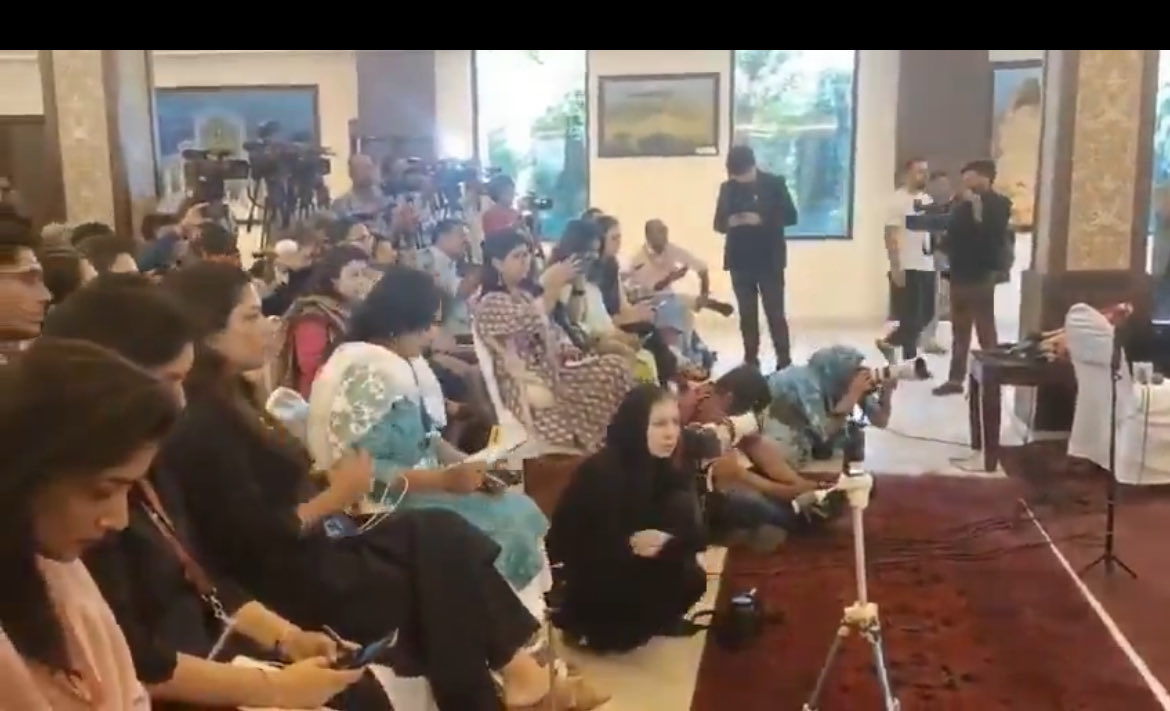A Diplomatic Farce: When Public Service Becomes a Platform for Personal Promotion
Taliban foreign minister Amir Khan Muttaqi on Sunday addressed a press conference in New Delhi where both male and female journalists were present. This is a marked departure from the earlier controversy that erupted over the exclusion of women reporters from a similar event.
Speaking at the presser, Muttaqi addressed the backlash over the earlier incident, saying the exclusion of women was not deliberate but rather a result of logistical constraints.
 |
| Women journalists at Taliban Presser. Image Via: Dr Pooja Tripathi |
The clarification came after significant condemnation from opposition leaders, press freedom bodies, and civil society.
The Editors Guild of India and the Indian Women Press Corps (IWPC) had issued strong statements, calling the exclusion “blatant gender discrimination on Indian soil.”
The controversy had drawn sharp political reactions, with Congress general secretary Priyanka Gandhi Vadra asking Prime Minister Narendra Modi to clarify his stance on women’s rights, and Leader of the Opposition Rahul Gandhi stating that “your silence in the face of such discrimination exposes the emptiness of your slogans on Nari Shakti.”
While the Ministry of External Affairs (MEA) had earlier clarified that India had no role in organizing that press conference at the Afghan Embassy, the optics surrounding a Taliban minister speaking on Indian soil under such restrictions became a flashpoint in the national discourse.
The situation shows a broader shift in India's diplomatic approach to Afghanistan. Muttaqi's ongoing visit marks the first by a senior Taliban official since the group's return to power in Kabul in 2021.
Although India has not formally recognized the Taliban government, it has gradually re-engaged, citing regional security imperatives.
On Friday, during talks with Indian officials, both sides emphasized the need to combat cross-border terrorism, identifying “regional countries” -- a veiled reference to Pakistan -- as shared sources of instability.
Muttaqi’s engagements in India included meetings with India’s National Security Advisor Ajit Doval and other top diplomats. However, his scheduled visit to Agra on Sunday was cancelled without explanation.
On Saturday, he visited the Darul Uloom Deoband, a major Islamic seminary that has historical ties to Afghan religious scholarship and political influence.
His trip comes at a time when both India and Afghanistan are facing tense relations with Pakistan. The Taliban has accused Pakistan of airstrikes on Afghan territory and has retaliated with what it describes as “heavy clashes” along the border.
India too has witnessed heightened border hostilities with Islamabad, including escalations in Jammu and Kashmir.
The reversal on the inclusion of women journalists in Sunday’s event is being seen as a positive, if minor, course correction by the Taliban delegation. But the deeper questions raised by the earlier presser remain unresolved.
India’s decision to allow a Taliban official to address the press -- under conditions that initially mirrored the group’s own regressive norms -- has drawn scrutiny of New Delhi’s diplomatic discretion and its media environment.
This episode has also reignited conversations around journalistic independence in India. The initial silence of many prominent media figures over the exclusion of women -- until politicians intervened -- reflects a growing erosion of editorial integrity in a press landscape increasingly shaped by access, affiliations, and algorithmic visibility.
At a time when artificial intelligence tools enable rapid production and dissemination of aligned narratives, the accountability and credibility of those wielding microphones become even more critical.
The Ministry of External Affairs, which distanced itself from the event, must now confront uncomfortable questions not only about India’s diplomatic posture but also about its own representatives. Repeated violations of institutional codes of conduct by certain individuals -- who appear more invested in self-branding than national interest -- demand urgent internal review.
Public service -- particularly in the foreign service -- must be anchored in the values of societal contribution, intellectual rigour, and institutional responsibility. It is not a space for vanity projects cloaked in the language of public good. This is not to suggest that diplomats must disengage from literature, art, or cultural production.
India has a rich tradition of civil servants who have made enduring contributions to these fields. But that tradition was built on substance, not shortcuts; on scholarship, not social media; on mastery, not manipulation.
The late Bibek Debroy is one such example. An economist of stature and a Sanskrit scholar of immense depth, his work in translation, public policy, and advisory roles spoke for itself -- as did the integrity of his conduct in public life. He did not need to leverage the state apparatus to amplify his presence or manufacture credibility.
Contrast this with the emerging trend where some within the diplomatic corps -- instead of acting as stewards of India's global interests -- are more invested in cultivating personal brands through poetry circuits, book launches, curated praise, and selective gatekeeping in the arts. That is far from contribution. It is opportunism with diplomatic privileges as leverage.
This growing conflation of state platform and self-promotion is a distortion. It reduces India's vast cultural diplomacy machinery to a tool for individual amplification, rather than national enrichment. It betrays the hard work of those who have earned their place in the literary or cultural domain without proximity to power. And it sends a dispiriting signal to every young Indian who still believes merit matters.
It is imperative that institutions like the Indian Council for Cultural Relations (ICCR) guard against monopolies being built in the name of India’s cultural soft power. The ICCR’s mandate must not be reduced to enabling diplomatic vanity projects.
Instead, it should protect the space for real voices, diverse talent, and genuine contribution -- especially from those who have no access to the corridors of state but plenty to offer because if art, culture, and diplomacy are all bent toward the same mirror, then what remains is not a vision of India but a reflection of ambition, disguised as service.
ALSO READ:
